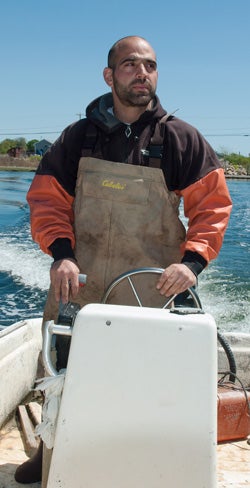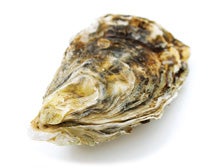The World Is His Oyster
Perry Raso certainly knows how to nurture things. He started eight years ago creating an oyster farming business that today ships shellfish to several states. In the process, he has become an employer and mentor to URI students, a collaborator with URI researchers and alumni, the potential marketer of a unique “vegetable,” and, most recently, the owner of one of the most popular restaurants in southern Rhode Island.
Talk about getting mileage out of his two URI aquaculture degrees.
Raso earned his undergraduate degree in 2002 and received his master’s four years later; he is one alum who has never forgotten his URI roots. Through his businesses and his interest in aquaculture he has forged an alliance with various elements of the University. His approach is quite in keeping with the initiative announced by URI President David M. Dooley, who envisions a partnership role between the University and the state’s small businesses.
 Raso is owner of the Matunuck Oyster Farm in South Kingstown. Located in a shallow section of Potter Pond, the farm covers seven acres and features a novel system of PVC pipe racks that are arranged on the salt pond’s sandy bottom. Heavy plastic net bags of oysters of various sizes are stacked on the racks. Raso buys the tiny oyster seed, about 1 mm across, from a Connecticut nursery. As the oysters grow they are shifted to larger size bags until they reach market size—about three inches across.
Raso is owner of the Matunuck Oyster Farm in South Kingstown. Located in a shallow section of Potter Pond, the farm covers seven acres and features a novel system of PVC pipe racks that are arranged on the salt pond’s sandy bottom. Heavy plastic net bags of oysters of various sizes are stacked on the racks. Raso buys the tiny oyster seed, about 1 mm across, from a Connecticut nursery. As the oysters grow they are shifted to larger size bags until they reach market size—about three inches across.
Tending the farm is a year-round process even in the dead of winter when heavy thermal wet suits are necessary to sort and harvest the shellfish and send them to restaurants and stores in Boston, New York, Philadelphia, Maryland, and Georgia.
Distribution of the oysters is handled by the Ocean State ShellFish Cooperative that Raso founded in concert with fellow alumni Robert Reault ’95, John West ’94, and Graham Brawley ’02. Reault, who started and then sold Moonstone Oyster Farm, is now an advisor to the cooperative. West is the current owner of Moonstone, and Brawley is the former owner of Moonstone and currently general manager of the cooperative.
While Raso has forged links with other URI alumni, he is particularly enthused about maintaining connections with current URI students.
As an undergraduate, Raso was a URI Coastal Fellow, and he has never forgotten the experience. The Coastal Fellows is a program based in the College of the Environment and Life Sciences that matches students with faculty and staff mentors for experiential learning experiences for nine months. The students typically help their mentors with research projects. At the end of the program, the students present posters that describe the projects and the findings. The program allows students to develop skills that are important for their majors and possibly for their future occupations.
Ever since he graduated and founded his oyster farm, Raso has been a Coastal Fellows mentor, taking one student under his wing each year. “The program means a lot to me,” he says.
Most recently, Raso had Ariel Tobin, a fisheries and aquaculture major who graduated in May, on his farm working on a unique project—growing certain seaweed that Raso thinks has potential to be developed and marketed as an edible “vegetable.”
“I regard seaweed as a sea vegetable,” says Raso who notes that certain types of edible seaweeds are popular in Asia.
The seaweed Tobin and Raso were experimenting with is gracilaria. Tobin, who hails from Florida but now lives in Middletown, R.I., says gracilaria is “crispy with a slight briny flavor.” Raso, who would like to grow the seaweed alongside his oysters, has charged Tobin with exploring the optimum growing conditions. She has also worked part-time in the oyster operation.
Raso says getting the seaweed approved for human consumption is a bit of a challenge, but he has allies on the URI faculty helping him: Chong Lee, a nutrition expert in the Department of Nutrition and Food Services, and Carol A.Thornber, an assistant professor in the Department of Biological Sciences who does research on macroalgae. In addition, Raso has enlisted help from a researcher at the University of Connecticut.
Raso admits getting people to dig into seaweed on their dinner plates or in their salads will be a challenge, but he knows one restaurant that would be willing to put it on its menu—his own.
In March 2009, Raso noticed that a piece of waterfront commercial land with a restaurant on it was for sale in Jerusalem, adjacent to his oyster farm. He bought it and the oyster farmer became a restaurateur.
“I always thought I would never want to be in the restaurant business, but I lived across the road from this place and saw it change hands three times. The way the economy was last year, I got a lot of advice not to open it.”
 But open it he did. Today the Matunuck Oyster Bar is one of the busiest seafood restaurants in South County. The signature feature is an oyster bar whose wooden surface is a map of Narragansett Bay showing the location of numerous oyster farms; Matunuck is about the sixth biggest in the state.
But open it he did. Today the Matunuck Oyster Bar is one of the busiest seafood restaurants in South County. The signature feature is an oyster bar whose wooden surface is a map of Narragansett Bay showing the location of numerous oyster farms; Matunuck is about the sixth biggest in the state.
The restaurant employed 50 last summer, half of them part-time, and was open seven days a week. With the addition of a patio, Raso has a capacity to seat well over 100 diners at a time, and he has tentative plans to expand the inside seating because he wants the restaurant to be open year-round. Last winter he was open four days a week. This summer he plans to drop breakfast—“it was just so crazy”—and concentrate on lunch and supper. As expected, the menu is heavy on shellfish—oysters not only from his farm but from several other local oyster farms. The few meat dishes feature grass-fed beef from a South County farm. Raso’s mother and grandmother make all the desserts.
Among Raso’s current employees with URI connections are Thad Chappel, a student who works at farmers’ markets and at the restaurant; Ryan Davis, an aquaculture student who works at the Coastal Growers Farmers’ Market in North Kingstown; and Chris Andrikos, who works with Professor Lee on the seaweed project and at farmers’ markets. And Raso regularly hires restaurant servers who are from URI.
Raso participates in farmers’ markets throughout the state, from Providence to Newport. In addition, his restaurant offers another feature—tours of his oyster farm.
School groups, guided by URI students, take visitors literally into the farm. “I have about 60 waders,” says Raso, noting the tour starts right off from his waterfront patio.
“I started the tours with the help of Sea Grant,” he explains. The grant has expired, but Raso appreciates the educational opportunities that the tours have provided and so continues them.
What’s next is anyone’s guess. Raso has devoted his life to sustainable local aquaculture and also hopes to go international: “What I really want to do is someday be able to help start aquaculture farms in developing countries.”
— By Rudi Hempe ’62
 Home
Home Browse
Browse Close
Close Events
Events Maps
Maps Email
Email Brightspace
Brightspace eCampus
eCampus


